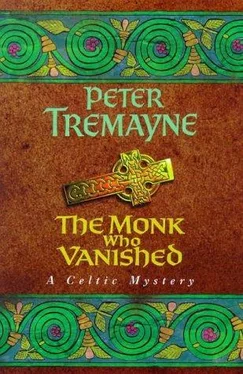Peter Tremayne - The Monk Who Vanished
Здесь есть возможность читать онлайн «Peter Tremayne - The Monk Who Vanished» весь текст электронной книги совершенно бесплатно (целиком полную версию без сокращений). В некоторых случаях можно слушать аудио, скачать через торрент в формате fb2 и присутствует краткое содержание. Жанр: Исторический детектив, на английском языке. Описание произведения, (предисловие) а так же отзывы посетителей доступны на портале библиотеки ЛибКат.
- Название:The Monk Who Vanished
- Автор:
- Жанр:
- Год:неизвестен
- ISBN:нет данных
- Рейтинг книги:3 / 5. Голосов: 1
-
Избранное:Добавить в избранное
- Отзывы:
-
Ваша оценка:
- 60
- 1
- 2
- 3
- 4
- 5
The Monk Who Vanished: краткое содержание, описание и аннотация
Предлагаем к чтению аннотацию, описание, краткое содержание или предисловие (зависит от того, что написал сам автор книги «The Monk Who Vanished»). Если вы не нашли необходимую информацию о книге — напишите в комментариях, мы постараемся отыскать её.
The Monk Who Vanished — читать онлайн бесплатно полную книгу (весь текст) целиком
Ниже представлен текст книги, разбитый по страницам. Система сохранения места последней прочитанной страницы, позволяет с удобством читать онлайн бесплатно книгу «The Monk Who Vanished», без необходимости каждый раз заново искать на чём Вы остановились. Поставьте закладку, и сможете в любой момент перейти на страницу, на которой закончили чтение.
Интервал:
Закладка:
‘God protect us!’ cried Brother Madagan. His voice was almost a despairing wail. ‘Can’t you see? They are cutting down the sacred yew-tree.’
‘Better that than they cut down people,’ observed Eadulf in black humour, still not understanding the significance of the raiders’ actions.
‘Remember what I told you,’ Fidelma spoke sharply. Even she had a sudden pale cast to her features. ‘This is the sacred tree symbol of our people said to have been planted by the hand of Eber Fionn himself, the son of Milesius, progenitor of the Eóghanacht of Cashel. It is an ancient belief among our people, Eadulf, that the tree is the symbol of our well-being. If the tree flourishes, we flourish. If it is destroyed …’
She did not finish.
Eadulf received the statement in silence. Once again he was confounded by the curious mysticism of this land that he had grown to love. On the one hand the country was more Christian than any of the Saxon kingdoms he knew of. On the other it was far more pagan than most Christian lands he knew. And Fidelma, the most rational and analytical of people was actually troubled by the fact that someone was cutting down the great yew-tree. Eadulf began to realise the true significance of that symbolism. He had always thought that in pagan times the trees had been worshipped. He now realised that this was but a special veneration for trees as symbolic of the oldest living things in the world. Living! What was happening through the destruction of this symbol, which was called ‘The Tree of Life’, was much more than an insult to the Eóghanacht dynasty of Cashel. It was a means of dispiriting them and their people.
There were many things he felt he ought to say but then considered it wiser to say nothing.
They could just hear, in spite of the tolling of the great bell, the axes of the attackers biting into the ancient wood with a rhythmic sound that seemed at odds with the din of destruction and death.
Brother Bardan, the apothecary, came up onto the roof followed byyoung Brother Daig, his assistant. Bardán immediately knelt by the abbot and examined his wound.
‘He has been struck a nasty blow but it is not life threatening,’ the apothecary commented after a cursory examination. ‘Brother Daig will help me carry him to his chamber.’ He glanced up at Brother Madagan. ‘What are our chances, Brother?’
‘Not good. They are not attacking the abbey as yet but they are cutting down the great yew.’
Brother Bardán gave a sharp intake of his breath and genuflected as he looked over the wall to confirm the truth of what Brother Madagan had said. For a moment he stood mesmerised by the sight beyond. The sound of axes being swung was clear now. The apothecary shook his head in dismay.
‘So that is why they are not attacking the abbey directly,’ he observed softly. ‘They do not have to.’
‘Oh, for a few good archers,’ Fidelma cried in frustration.
Brother Daig looked momentarily shocked. ‘Lady, we are of the Faith,’ he protested.
‘That does not mean that we should let ourselves be destroyed.’
‘But Christ taught …’
Fidelma made a typical gesture of impatience, a cutting motion of her hand. ‘Do not preach to me of poverty of spirit as a virtue, Brother. When men are poor in spirit then the proud and haughty oppress them. Let us be true in spirit and determined to resist oppression. Only then do we not court further oppression. I say again, a good archer might save this day.’
‘There are no such weapons in the abbey,’ Brother Bardan commented, ‘let alone men to use them.’ He turned back to the unconscious abbot. ‘Come on, Daig, we must see to the abbot’s welfare.’
They lifted the elderly abbot between them and carried him down the stairs.
For some time Fidelma, Eadulf and Brother Madagan stood in frustration watching the attackers hacking at the old tree. It was impossible for Eadulf to entirely empathise with the angry impotency shared by Fidelma and Madagan as they stood watching its destruction. He could intellectualise about its meaning but to actually feel the alarm and trepidation that the act was causing, was still beyond him.
His eyes suddenly caught sight of a movement and Eadulf pointed across the square.
‘Look! Someone is running towards the gates of the abbey. A woman!’
A shadow had detached itself from the burning buildings and wasrunning and stumbling forward in an obvious attempt to gain the protection of the abbey gates.
‘The gates are closed,’ Brother Madagan cried. ‘We must go down and open them for the poor creature.’
With one more quick glance at the scene below and realising that she could do no more from that vantage point, Fidelma turned and followed Brother Madagan and Eadulf to the courtyard.
At the gate they found Brother Daig who had apparently just returned after helping the abbot back to his chamber.
‘Get the gate open,’ shouted Brother Madagan as they hurried up. ‘There is a woman trying to enter!’
The young man hesitated with an alarmed expression. ‘But that might let the attackers in,’ he protested.
Eadulf simply pushed the young man aside and began to tug on the wooden bolts.
Brother Madagan joined him.
Together, they drew back the great wooden bars which secured the gates, much to the consternation of several of the other brethren who gathered behind Brother Daig. They appeared uncertain what to do. Eadulf and Madagan pulled the main gates inwards.
The running woman was a dozen paces away from the gates. Eadulf had a feeling that she seemed familiar. He moved forward to shout words of encouragement to her but, to his dismay, he saw that a mounted raider had began to pursue the woman and was about to overtake her.
Brother Madagan ran forward through the gates and was holding his crucifix before him as if it would turn back the approaching warrior just by the sight of it.
‘Templi insulaeque!’ he cried. ‘Sanctuarium! Sanctuary! Sanctuary!’
He had managed to insert himself between the woman and the approaching rider whose sword was upraised, the blade flashing against the light of the fires across the square.
The warrior’s sword arm swung back and Brother Madagan half spun, a splash of red across his forehead. Then he fell face down on the ground. Eadulf reached forward to pull the woman to safety but the attacker reached her first. His sword swung again and she gave a shriek as it smashed into the back of her head. The momentum still carried her forward and she stumbled into the abbey courtyard.
The forward motion of the charging horse of the pursuer also carried the warrior forward through the gates, the horse clattering into the paved courtyard. What happened next took place so quickly that no one had time to draw breath before it was over.
The momentum of the horse had knocked the wounded womanaside so that she spun forward, crashing against a wall, and fell onto the ground. Eadulf himself only had time to turn sideways to avoid being knocked down by the horse. As he swung round, some instinct had caused him to grab the leg of the rider and heave with all his might. The rider, already precariously balanced by the effort of his swinging sword arm, came unseated and, as Eadulf fell, he was dragged down from his saddle. The man fell hard but on top of Eadulf, driving the breath from him so that Eadulf lay stunned and unable to move.
The warrior was a professional. His fall cushioned by Eadulf, he half rolled over and sprung to his feet, coming up in a fighting crouch, sword in hand, ready to face any attack.
He was stocky but well-muscled. Thus much could be seen of him but he was clad in black dyed linen with an iron coat of chainmail, the luirech iairn, over a corselet made of bull-hide leather. From the knee down his legs were protected by leather asáin studded in brass; the leather encasing the lower legs was tied firmly. He bore a helmet of polished brass with a small visor over his eyes so that the only feature that could be seen in the flickering light of the courtyard’s brand torches was a thin red slit of a cruel mouth.
Читать дальшеИнтервал:
Закладка:
Похожие книги на «The Monk Who Vanished»
Представляем Вашему вниманию похожие книги на «The Monk Who Vanished» списком для выбора. Мы отобрали схожую по названию и смыслу литературу в надежде предоставить читателям больше вариантов отыскать новые, интересные, ещё непрочитанные произведения.
Обсуждение, отзывы о книге «The Monk Who Vanished» и просто собственные мнения читателей. Оставьте ваши комментарии, напишите, что Вы думаете о произведении, его смысле или главных героях. Укажите что конкретно понравилось, а что нет, и почему Вы так считаете.












